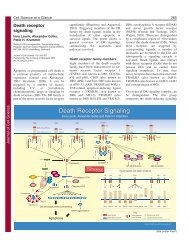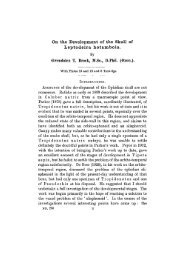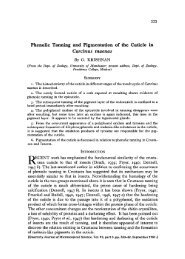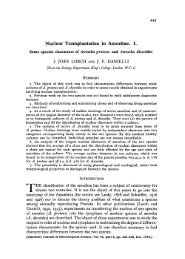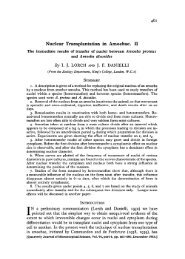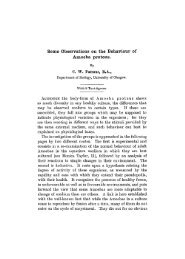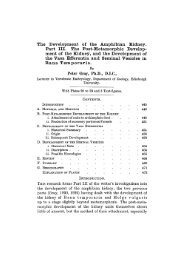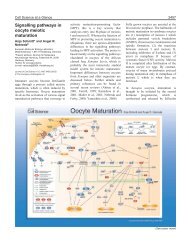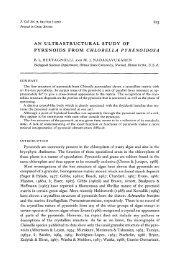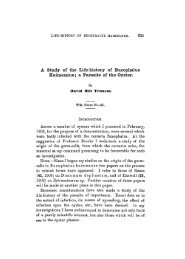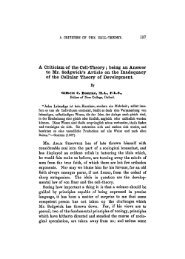Meetings of the Moles - Journal of Cell Science - The Company of ...
Meetings of the Moles - Journal of Cell Science - The Company of ...
Meetings of the Moles - Journal of Cell Science - The Company of ...
Create successful ePaper yourself
Turn your PDF publications into a flip-book with our unique Google optimized e-Paper software.
Sticky Wicket<br />
2373<br />
An occasional column, in which<br />
Caveman and o<strong>the</strong>r troglodytes<br />
involved in cell science emerge to<br />
share <strong>the</strong>ir views on various<br />
aspects <strong>of</strong> life-science research.<br />
Messages for Mole can be left at<br />
mole@biologists.com.<br />
Any correspondence may be<br />
published in forthcoming issues.<br />
<strong>Meetings</strong> <strong>of</strong> <strong>the</strong> <strong>Moles</strong><br />
So what’ll it be? Shooshing <strong>the</strong> slopes<br />
through deep Utah powder or sunning on<br />
<strong>the</strong> sand while <strong>the</strong> surf surges and <strong>the</strong><br />
cocktails are mixed? Treats in Trieste or<br />
Manhattans in Miami?<br />
Of course, I’m perusing this year’s<br />
schedule <strong>of</strong> scientific meetings – so<br />
many and so little time. Okay, we know<br />
that <strong>the</strong> reality is not quite so wonderful.<br />
We have to spend much <strong>of</strong> <strong>the</strong><br />
time in darkened rooms, absorbing<br />
presentations and poring over posters,<br />
and, even when we finish and head for<br />
<strong>the</strong> restaurants and bars, we interrupt<br />
jokes and stories to ask technical<br />
questions or solicit <strong>the</strong> informed<br />
opinions <strong>of</strong> our peers. One only has to<br />
consult <strong>the</strong> accompanying non-scientist<br />
partner <strong>of</strong> any <strong>of</strong> <strong>the</strong> participants to<br />
know that <strong>the</strong> meetings are (or at least<br />
seem) bone-achingly boring from <strong>the</strong><br />
entertainment perspective, especially<br />
when put up against <strong>the</strong> dream meetings<br />
we envision from our <strong>of</strong>fices.<br />
<strong>The</strong>re is a move afoot to change <strong>the</strong><br />
system, knock it down – stop wasting<br />
time, money and energy on this ancient<br />
system <strong>of</strong> face-to-face exchange,<br />
which is outmoded in this era <strong>of</strong><br />
rapid publication, webcasts and<br />
teleconferences. If you want to go on<br />
holiday, say <strong>the</strong> critics, just go on<br />
holiday. <strong>Meetings</strong>, <strong>the</strong>y contend, should<br />
go <strong>the</strong> way <strong>of</strong> mimeographs, leg<br />
warmers and power lunches.<br />
So, what are meetings actually for?<br />
(Aside, <strong>of</strong> course, from having fun,<br />
although <strong>the</strong> image <strong>of</strong> frolicking<br />
scientists wobbling precariously around<br />
a dance floor may be too much for those<br />
with sensitive dispositions. And don’t<br />
even think about hot tubs). <strong>The</strong> kneejerk<br />
response, certainly, is that <strong>the</strong>y are<br />
for <strong>the</strong> dissemination <strong>of</strong> information.<br />
<strong>The</strong> literature, especially in recent years,<br />
has come to resemble ‘<strong>The</strong> Blob’,<br />
growing and consuming everything in its<br />
path, and Steve McQueen isn’t going to<br />
come to our rescue. Nobody reads it. In<br />
fact, now that journals are all online, we
2374 <strong>Journal</strong> <strong>of</strong> <strong>Cell</strong> <strong>Science</strong> 116 (12)<br />
don’t have to look at <strong>the</strong> titles – having<br />
<strong>the</strong> papers comfortably stored in<br />
cyberspace is <strong>the</strong> same as actually<br />
knowing what <strong>the</strong>y say, right?<br />
I’m still waiting for <strong>the</strong> brain sockets<br />
that will let us download information<br />
directly into our own wet storage. Until<br />
<strong>the</strong>n, having <strong>the</strong> stuff online is not <strong>the</strong><br />
same as reading it, because, unless it is<br />
loaded into our brain, <strong>the</strong> information is<br />
not available for our creative machinery<br />
to manipulate, extrapolate, incorporate<br />
and integrate into something great.<br />
Creativity needs input, and much <strong>of</strong> <strong>the</strong><br />
input comes from <strong>the</strong> literature. You<br />
know how this works: we put a bunch <strong>of</strong><br />
observations into <strong>the</strong> brain blender, add<br />
some questions and observations,<br />
garnish with something we might have<br />
heard somewhere, hit frappé and serve it<br />
in a chilled glass. Yum – a frozen idearita!<br />
So, you say, that’s why we go to<br />
meetings, <strong>the</strong>n – to learn what’s new so<br />
that we don’t have to read <strong>the</strong> literature<br />
(and don’t have to feel guilty about not<br />
doing it). It is our penance – we don’t<br />
study and read, and so sometimes we<br />
have to go to that meeting in upstate<br />
New Hampshire and be eaten by<br />
mosquitoes.<br />
No, I say! That isn’t it. I contend that<br />
scientific meetings are not just<br />
important, <strong>the</strong>y are essential, because<br />
<strong>the</strong>y represent our best hope <strong>of</strong> knowing<br />
what in <strong>the</strong> literature we should or<br />
should not believe. What? Belief?<br />
<strong>Science</strong> is facts, right? It’s hard and<br />
focused, sharp, like Occam’s razor. True<br />
is true.<br />
For any graduate students reading this<br />
instead <strong>of</strong> doing something useful, <strong>the</strong><br />
answer is ‘correct.’ <strong>The</strong> end. Now go do<br />
an experiment.<br />
(Are <strong>the</strong>y gone?) We have to face <strong>the</strong><br />
fact that science is based on <strong>the</strong><br />
philosophically untenable idea that just<br />
because something happens to work a<br />
few times, it must be true. Even if we do<br />
it hundreds <strong>of</strong> times, it doesn’t proscribe<br />
a truth. You know, black swans. (I<br />
shouldn’t have to do this, but <strong>the</strong> logic<br />
goes something like this. Kangaroos are<br />
never found in bars. We check thousands<br />
<strong>of</strong> bars carefully and none have<br />
kangaroos. So we have identified a truth<br />
– until, <strong>of</strong> course, we meet a kangaroo<br />
in a bar.) Until <strong>the</strong> appearance <strong>of</strong> <strong>the</strong><br />
black swan, all swans were white, and I<br />
guess we occasionally do get kangaroos<br />
in bars (“but at <strong>the</strong>se prices, you aren’t<br />
going to get many more”).<br />
So who do we believe? We could do <strong>the</strong><br />
experiments ourselves and that might<br />
give us confidence, but are we going to<br />
do that every time <strong>the</strong>re is a discrepancy<br />
in <strong>the</strong> literature? If we do do that, we are<br />
never going to publish anything original,<br />
are we? Or we can wait until more labs<br />
weigh in, but how can we speed along<br />
our own research if we sit around<br />
waiting for o<strong>the</strong>rs?<br />
What we need is more information. Is<br />
this latest report from a group that we<br />
know carefully checks its results and<br />
ensures that <strong>the</strong>y fit into a broader<br />
body <strong>of</strong> work and <strong>the</strong>oretical concepts<br />
or does it rush to publish whatever<br />
might get a rise and <strong>the</strong>n drop it for <strong>the</strong><br />
next easy hit? With more information<br />
we can make a guess as to who might<br />
be right and <strong>the</strong>n go ahead and apply<br />
<strong>the</strong> knowledge to our own research<br />
designs. This would be to our<br />
competitive advantage, too, if we figure<br />
out what’s right before everyone else<br />
does.<br />
So how do we get this information?<br />
One useful way is to study what has<br />
been called <strong>the</strong> track record – we check<br />
everything <strong>the</strong> lab has published and<br />
see if <strong>the</strong>y tend to be right. And this is<br />
a useful approach, but only if <strong>the</strong>y’ve<br />
been on <strong>the</strong> track for a while. <strong>The</strong> o<strong>the</strong>r<br />
way to do this is to use <strong>the</strong> same method<br />
we use each day to decide who we can<br />
and can’t trust. We meet <strong>the</strong>m, talk<br />
to <strong>the</strong>m, get an impression <strong>of</strong> <strong>the</strong>m.<br />
<strong>The</strong>re are people we loan money to<br />
without hesitation (don’t look at me<br />
like that!) and people we wouldn’t trust<br />
with our pocket lint. <strong>The</strong>re are some<br />
scientists I simply believe when <strong>the</strong>y<br />
tell me that <strong>the</strong>ir new molecule is green,<br />
and o<strong>the</strong>rs for whom I would take what<br />
<strong>the</strong>y tell me with more than a proverbial<br />
grain <strong>of</strong> salt if <strong>the</strong>y said ‘it’s a nice<br />
day’.<br />
And that’s what we need meetings for.<br />
When I was a lowly graduate student,<br />
I met fellow students at meetings, and<br />
some <strong>of</strong> <strong>the</strong>m I learnt I could trust and<br />
indeed I have trusted <strong>the</strong>m all <strong>the</strong>se<br />
years – <strong>the</strong> same for postdocs, assistant<br />
pr<strong>of</strong>essors and pundits. <strong>The</strong>se are our<br />
peers, and we have to get to really and<br />
truly know <strong>the</strong>m and decide for<br />
ourselves whom we trust. This can’t be<br />
done with webcast lectures or online<br />
discussion sessions. It takes face-t<strong>of</strong>ace<br />
meetings. Without it, we have<br />
only <strong>the</strong> cold, cold literature, which is<br />
okay but can never carry <strong>the</strong> personal<br />
touch <strong>of</strong> <strong>the</strong> real meeting. And that’s<br />
why telling stories and jokes, skiing<br />
toge<strong>the</strong>r or snorkeling <strong>the</strong> reef, talking<br />
about where we grew up and why we<br />
became scientists is part <strong>of</strong> <strong>the</strong> process<br />
– it’s all about getting to know each<br />
o<strong>the</strong>r. If we lose <strong>the</strong> opportunity to<br />
meet with our colleagues, we lose<br />
something that is distinctly human<br />
about science. And, make no mistake,<br />
science remains a uniquely human<br />
endeavor. So go ahead; book that<br />
meeting. And don’t forget to pack <strong>the</strong><br />
sunblock.<br />
Mole<br />
<strong>Journal</strong> <strong>of</strong> <strong>Cell</strong> <strong>Science</strong> 116, 2373-2374 © 2003<br />
<strong>The</strong> <strong>Company</strong> <strong>of</strong> Biologists Ltd<br />
doi:10.1242/jcs.00416



